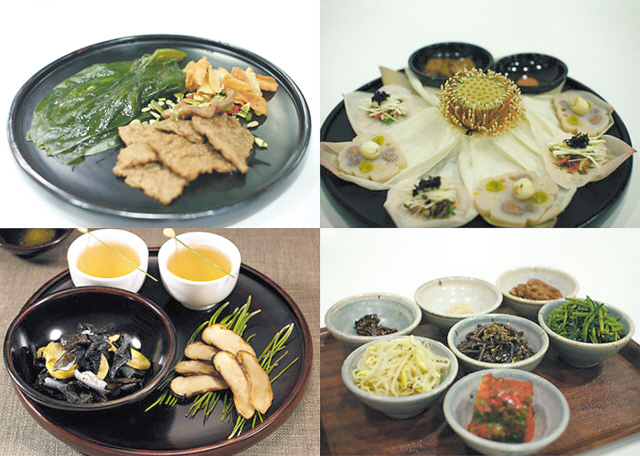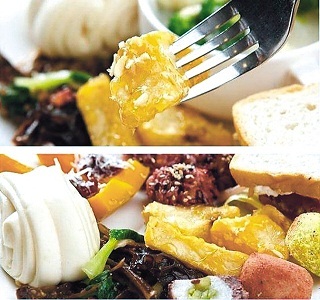Not mainstream yet, but vegetarian diet attracts health, environment-conscious eaters around the world.
 |
Although, for we Indian vegetables are abundant and people enjoy platters made by colorful and healthy vegetables rather than red or white meats. “These days, people know what vegetarianism is, one can call a Chinese restaurant and ask for black bean sauce noodles with only onions and sauce,“When one goes to a restaurant, one can ask for dishes to be made without meat and people do not react negatively to such requests.”
Yi also believes perceptions of vegetarians have shifted.
If six to seven years ago vegetarians were seen as somewhat extreme, now, in Yi’s opinion, vegetarians are seen in a positive light.
People, according to Yi, see vegetarians as healthy and environmentally conscious individuals.
The positive attitude towards the vegetarian diet seems to be due, in part, to Korea’s “well-being” and “healing” trends, both of which have fueled societal interest in health.
“Among the masses, health is still the biggest impetus behind interest in vegetarianism,” said cable channel Olive team head Seo Won-ye. “I think people are interested in vegetarianism for their own health, for dieting, for digestive reasons or to change their physical constitution.”
Seo added that “people are very interested in vegetarianism and detoxification as a means of dieting.”
 |
| Some of the vegetarian temple food dishes that are offered at Baru restaurants.(Baru) |
Though the food channel does not devote entire programs to vegetarianism, Seo said Olive plans to frequently address it in upcoming and new shows like the revamped “Homemade Cook,” where doctors help provide recipes that address various health concerns.
“Vegetarianism is not a minor phenomenon,” Seo, 36, said over the phone. “We cannot help but touch upon the subject more frequently.”
Indeed, Olive has addressed vegetarianism most notably with “Lee Honey Vegan Recipe,” a segment of its celebrity-fronted cooking program “Food Essay.”
When the segment aired over a year ago, “people were familiar with the concept of vegetarianism, but the lifestyle was not widespread,” said Seo.
“We did our homework and discovered a lot of people were interested in vegetarianism, so we focused on providing recipes for those just starting out.”
The segment showcased pescetarian recipes and, according to Seo, the response was good.

“Repeat airings were also well received, and the recipes were especially popular among women in their 20s and 30s.”
Recipes, it appears, are important to practicing vegetarians in Korea. Vegetarian magazine Begun also devotes a substantial number of pages to recipes, partly to provide diverse eats for vegetarians who might be bored with their current repertoire, said Yi.
Another reason behind the focus on vegetarian-friendly recipes both on television and in magazines like Begun might be because vegetarian, particularly vegan, options are not the norm when eating out.
Yet, even though vegetarian restaurants are not widespread and vegetarianism is not mainstream, various signs point to its increased presence in South Korean society.
In 2010, Seoul National University saw the successful launch of an on-campus vegetarian buffet.
Operated by the Seoul National University Cooperative, an independent, nonprofit corporation, the buffet was so popular that a second vegetarian locale was opened last year.
According to SNU Co-op headquarters director Lee Gyu-sun, the latest spot, a student restaurant where a vegetarian menu is provided as one of four menu options, was chosen because students wanted more access to meat-free meals.
Dongguk University also has an on-campus vegetarian buffet that opened in 2011. Operated by major food service company OURHOME, the buffet started off in a small room.
“During the buffet’s pre-official launch, it was hard to estimate how many would use it,” OURHOME manager Lee Sang-min explained via email. “After the pre-launch, there was not enough space for customers during peak hours so the buffet was moved to a larger space.”
“Lots of students who are curious about vegetarian cuisine and who are dieting or concerned about their health use the buffet,” said Lee, pointing to the possibility that vegetarianism or “flexitarianism,” otherwise known as semi-vegetarianism, might be gaining serious momentum, particularly among those who are health conscious.
According to Lee, this is OURHOME’s first and only time operating a vegetarian buffet. But after the campus buffet opened, other cafeteria operations have expressed interest in vegetarian options, asking OURHOME about the menu, costs and average number of customers.
Some might say that this is where vegetarianism-at-large stands. People and businesses are curious about it but view vegetarianism as unknown territory.
However, the recent launch of a blind date event for vegetarians by matchmaking agency Sunoo points to an alternative perspective on vegetarians as a niche community on the rise.
Approximately four months ago, Sunoo started holding blind date meetings once every two months for vegetarians. To date there have been two events where eight to 10 women were set up with the same number of men. The third event is slated for mid-March.
According to Sunoo founder and CEO James Lee, eight people have already signed up for the upcoming meeting.
“Response has been great,” Lee, 47, said over the phone.
Lee explained that a rise in the number of vegetarians starting three to five years ago was an impetus behind Sunoo’s vegetarian blind dates.
The agency’s decision to provide blind dates specifically for vegetarians seems to signal that the vegetarian community has grown significantly.
When vegetarian magazine Begun put out its first issue two years ago, there were 40 regular subscribers and around 100 copies were sold at bookstores in Korea. Now of the 1,200 copies printed, according to publisher Yi, around 1,000 are sold. That means that within the past two years, sales have gone up tenfold.
In fact, a pro-vegetarian community seems to be growing, in keeping with current trends, in an even more health-conscious direction.
VegeDoctor, an organization of doctors whose purpose is to promote a vegetarian diet as a healthy means of eating, was established nearly two years ago, and, according to Yi, vegetarian mothers who want to raise their children on a meat-free diet have built up a strong community through the Internet by sharing research and data on what to feed their children.

No comments:
Post a Comment